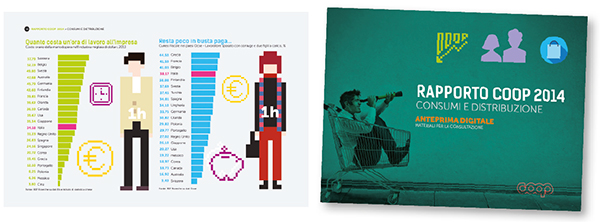Consumption and distribution: the Coop Report
Only (health) food products and mobile phone technology have resisted the general decline in consumption. On the other hand, Italians have resumed saving, and e-commerce is growing by double digits each year. Even if 2015 will see the end of the recession, Italians will maintain their cautious mid-crisis lifestyles.

It should have been the beginning of the recovery, but instead the economy halted at the edge of a precipice, balanced precariously between intractable obstacles.
Such are the findings of Coop’s 2014 “Consumption and distribution” report, drafted by the research division of the Italian consumers’ cooperative association with the help of the scientific expertise of Ref. Ricerche and analysis by Nielsen. Published as an interactive e-book that can be browsed and downloaded on Coop’s website, the report gives a snapshot of the state of consumption in Italy framed in the wider European and international context. The study also looks closely at the ways in which families have reacted to the new economic reality, the differences that characterize different regions of the country and comparisons with the rest of Europe.
Poor and parsimonious. Since 2007, Italy’s GDP has dropped by 15%, amounting to 230 billion euro, and Italians have seen their average disposable income reduced by 2,700 euro. 77% of the population, compared to the European average of 43%, report a negative assessment of quality of life in their country, and 91% are pessimistic about the economy. However, Italians continue to demonstrate a remarkable capacity for adapting, withstanding the blows of the recession and revolutionizing their lifestyle. Moreover, after years of decline, deposits into savings accounts have resumed growth (during the last two years, the amount of income saved has gone up by 1.7%).
The growth of e-commerce. Amid consumption levels that have been reduced to the bare minimum, the only sectors to avoid negative growth are that of food (but only ethical, ethnic, organic/vegan and health food products) and consumer technology, particularly mobile phones. Indeed, 46% of Italians use mobile Internet devices for an average of 2 hours per day (but are connected for nearly 5 hours), and e-commerce has grown by 20.4% last year alone.
Thus, Internet siphons spending from traditional retailers, including supermarkets and discount stores. According to the authors of the report, retailers are not keeping up with the profound rapid changes affecting consumption habits. In order to recover, the sector will have to offer more convenience combined with quality, more information and sharing, more possibilities of comparison and more smart access both online and in the shop.
In any case, according to Coop, in 2015 the recessive trends will end, although families will not return to pre-crisis consumption habits, since they have now gotten used to a more frugal lifestyle.

















